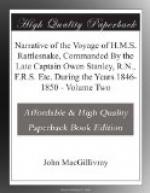The junction between the two races, or the Papuan from the north and the Australian from the south, is effected at Cape York by the Kowraregas, whom I believe to be a Papuanized colony of Australians, as will elsewhere be shown. In fact, one might hesitate whether to consider the Kowraregas* as Papuans or Australians, so complete is the fusion of the two races. Still the natives of the Prince of Wales Islands rank themselves with the islanders and exhibit a degree of conscious superiority over their neighbours on the mainland and with some show of reason; although themselves inferior to all the other islanders, they have at least made with them the great advance in civilisation of having learned to cultivate the ground, a process which is practised by none of the Australian aborigines.
(Footnote. Dr. Latham informs me that the Kowrarega language is undeniably Australian, and has clearly shown such to be the case: and although the Miriam language does not show any obvious affinity with the continental Australian dialects, yet the number of words common to it and the Kowrarega, I find by comparison of my vocabularies to be very considerable, and possibly, were we at all acquainted with the grammar of the former, other and stronger affinities would appear.)
The Kowraregas.
The Kowraregas speak of New Guinea under the name of Muggi (little) Dowdai, while to New Holland they apply the term of Kei (large) Dowdai. Their knowledge of the former island has been acquired indirectly through the medium of intervening tribes. The New Guinea people are said to live chiefly on pigs and sago; from them are obtained the cassowary feathers used in their dances, and stone-headed clubs. They trade with the Gumulegas, who exchange commodities with the Badulegas, from whom the Kowrarega people receive them. These last barter away to their northern neighbours spears, throwing-sticks, and mother-of-pearl shells for bows, arrows, bamboo pipes, and knives, and small shell ornaments called dibi-dibi. They have friendly relations with the other islanders of Torres Strait, but are at enmity with all the mainland tribes except the Gudang.
Mode of warfare illustrated.
Occasionally hostilities, frequently caused by the most trivial circumstances, arise between two neighbouring tribes, when incursions are made into each other’s territories, and reprisals follow. Although timely notice is usually given prior to an aggression being made by one tribe upon another, yet the most profound secrecy is afterwards practised by the invaders. As an illustration of their mode of warfare, in which treachery is considered meritorious in proportion to its success, and no prisoners are made, except occasionally, when a woman is carried off—consisting chiefly in a sudden and unexpected attack, a short encounter, the flight of one party and the triumphant rejoicings of the other on their return—I may state the following on the authority of Giaom.




